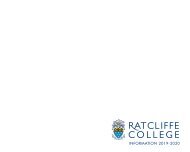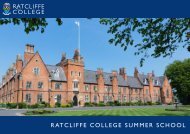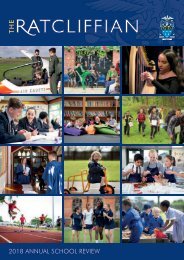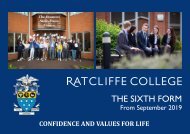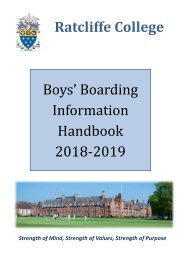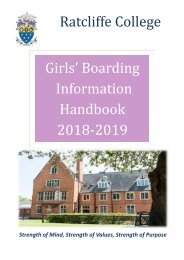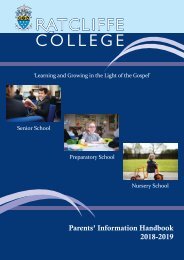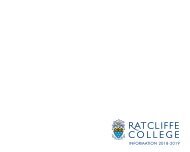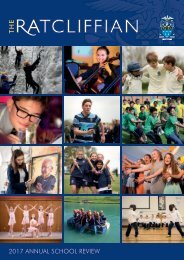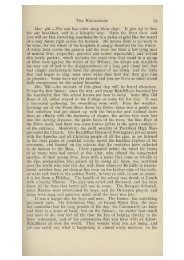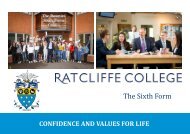Parents-Information-Handbook-2016-2017
Create successful ePaper yourself
Turn your PDF publications into a flip-book with our unique Google optimized e-Paper software.
Page 121<br />
Section 4 - Life Beyond the Classroom<br />
Duke of Edinburgh’s Award and Science Awards<br />
The Duke of Edinburgh’s Award (D of E)<br />
The Duke of Edinburgh’s Award is open to all students in Year 9 and above. It is a programme for young<br />
people that is known and recognised throughout the world. There are three levels to the programme -<br />
Bronze, Silver and Gold. At Bronze and Silver levels, pupils choose activities from four sections -<br />
volunteering, skills, physical and expedition. At Gold level, there is an additional section - residential.<br />
Individual challenge is the essence of the award, requiring assessed improvement from each student’s<br />
own starting point. Students set their own goals and are accredited for each section.<br />
The scheme encourages participation in a range of interesting, challenging and worthwhile activities. A<br />
students could become an actor, lead a team through open countryside, score goals for the county, spend a<br />
week on the high seas or make a real difference to the lives of others. Students are encouraged to develop<br />
their existing interests and to try new ones; the opportunities are endless. By participating in the Duke of<br />
Edinburgh’s Award they learn, by experience, the skills required for success: commitment, enterprise and<br />
effort. They discover a great deal about themselves and come to appreciate the enjoyment of working<br />
with, and for, other people.<br />
This is a very worthwhile activity and students are strongly encouraged to take advantage of the many<br />
benefits offered by the Award.<br />
Science Awards<br />
CREST, the EES and Go4SET<br />
The CREST (Creativity in Science and Technology) scheme allows students to pursue their interest in<br />
science through a programme of research and presentation. It encourages students to find creative<br />
scientific solutions to problems that they want to investigate. Not only is this an interesting activity, but it<br />
also helps students to develop the skills they need in their study of science, particularly in terms of how<br />
they approach coursework at GCSE and ‘A’ Level.<br />
The scheme has three levels – Bronze, Silver and Gold - and the amount of research time required<br />
increases at each level. The Gold Award is primarily for Sixth Form students. Each year, a group of Year<br />
12 Physics students aim towards their Gold Award by working with a local company and university to<br />
develop an engineering based project. This is called the EES (Engineering Education Scheme).<br />
There is also a national scheme for Year 9 students who are interested in engineering called Go4SET (Go<br />
for Science, Engineering and Technology). This competition raises the students’ awareness of the<br />
importance of eco-friendly energy production, and through the submission of a written report, building a<br />
model of their design, and presenting their findings to a panel of judges, the students earn a Silver Crest<br />
Award.<br />
Salters’ Challenge<br />
Salters’ Challenge is a competitive, practical activity, for Year 8 students<br />
Section 4 - The Duke of Edinburgh’s Award and Science Awards - Senior School





